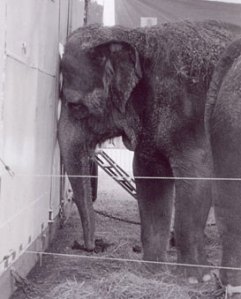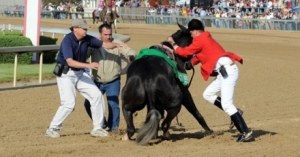A couple of months ago I wrote a post on why it is that people fail to take animal advocacy seriously. Today I want to elaborate that claim by illustrating it with a recent example. As most readers of AnimalBlawg probably know, President Obama swatted a fly during an interview with John Hardwood several weeks ago. Most viewers and commentators believed the episode was kind of funny. The President was amused by the event and commented on his Miyag i type ability to kill a fly with just one quick hand movement.
i type ability to kill a fly with just one quick hand movement.
The people at PETA, however, were not pleased. Condemning the President’s “inhumane” treatment of the fly, PETA spokesman Bruce Friedrich commented that “[w]e support compassion even for the most curious, smallest and least sympathetic animals…[w]e believe that people, where they can be compassionate, should be, for all animals.” In order to curb similar future incidents, PETA sent Obama a fly trapping device named “Katcha Bug Humane Bug Catcher”.
If all that they were trying to do was poke fun at the President, PETA’s reaction to the incident is amusing. One suspects, however, that PETA is actually taking this seriously. Lashing out against this conduct is misguided at best and counterproductive at worst. There are at least two problems with PETA’s position.
First, it is unclear whether flies are sentient beings. Several scientific studies suggest that flies do not have the capacity to feel pain (see, e.g., Eisemann, et al). Animal interests or rights stem from their sentience. Therefore, animals that do not have the capacity to feel pain should not have the same rights or interests as animals that have such a capacity. If flies are not sentient beings they should have the same interests or rights as other non-sentient beings such as trees and plants. If plants and trees do not have a right to life (as most people would argue), non-sentient animals should not have a right to life either.
Second, and more importantly, assuming that flies have the capacity to feel pain, the problem of insect mistreatment pales in comparison with other more pressing problems for the animal advocacy community. Most animal advocates agree that the chief evil that we should unite against is the incredibly inhumane practice of factory farming. The problem with PETA’s response to the fly swatting incident is that it provides the people we are trying to convince about the evils of factory farming (and other evidently cruel practices) with an argument against taking us seriously in general. The argument goes something like this:
(1) PETA represents animal advocates.
(2) PETA believes that swatting insects is immoral.
(3) PETA’s position regarding insects is ridiculous and should not be taken seriously.
(4) Therefore, PETA and other animal advocates should not be taken seriously.
I am well aware that (4) does not follow from (1),(2) and (3). I am also aware that PETA does not necessarily represent the animal advocacy community. This, however, is irrelevant. Regardless of the soundness of the argument, I believe it represents the way in which most people think about these issues. Take, for example, a comment posted on MSNBC’s website by a reader:
“Are you kidding me? PETA is upset because Obama killed a fly? Comments like this take away from their organizations credibility and make them look ridiculous. Are there not any other situations they could make an intelligent comment about this week?”
-Rebecca Alford, Hartsville, South Carolina (June 17, 2009).
The problem with this is that we have limited political capital with the community and have to be very judicious in our use of it. We should not use up our precious resources to combat acts that – like fly swatting – are neither clearly immoral nor central to our principal anti-cruelty crusade (eradicating factory farming). The costs of doing so are obvious. It weakens our credibility with the general public. The benefits, on the other hand, are marginal at best. If we want people to start taking animal advocacy seriously we should stop fussing over minor issues that make us look silly and concentrate on big picture issues like factory farming and animal experimentation.
Luis Chiesa
Filed under: Uncategorized | Tagged: activism, animal abuse, animal advocacy, animal cruelty, animal law, animal rights, animal suffering, factory farms, obama, PETA | 5 Comments »



 i type ability to kill a fly with just one quick hand movement.
i type ability to kill a fly with just one quick hand movement. This past Monday, at the invitation of the Committee to Ban Wild and Exotic Animal Acts,
This past Monday, at the invitation of the Committee to Ban Wild and Exotic Animal Acts, 

 Summer Bird
Summer Bird  Following up on the post below,
Following up on the post below,  Guest blogger: Elaine Hsaio
Guest blogger: Elaine Hsaio